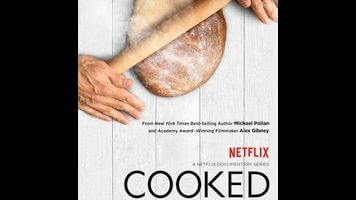Netflix’s Cooked bites off more than it can chew

Food is the key issue of the modern world, intricately connected to health, the environment, and poverty. It is also—according to Netflix’s four-part documentary series Cooked, based on the book by Michael Pollan, who hosts—the story of humanity itself. Everything from the formation of communities to the very path of evolution is directly related to what we put in our bodies—often, the show argues, without much thought.
This is a huge topic, and in trying to cover it all, Cooked comes off as both overstuffed and underdeveloped. The episodes take aim at a lot, with each featuring an anthropological look at an element of food, a modern take, a poetic interlude in a traditional community abroad, some detail about the chemistry of cooking, and a political section about a food issue. Each of those could support a far more in-depth look; Cooked would breathe better with more time or a couple of extra episodes, especially since the one with the heftiest subject—the state of modern food—is nearly 10 minutes shorter than the less-complex look at meat.
This isn’t to say the subject matter isn’t compelling in long stretches. It is, especially the further the show gets from the present day, where much of the information won’t come as news. Cooked excels with historical context, with the broader look at, say, bread-making throughout the ages. It is genuinely interesting to learn that homo sapiens may have evolved because their diet featured soft or cooked food—which required less chewing, freeing that energy up for brain development—or to see that the birth of culture can be traced back to the invention of cooking vessels. Meat cooked over a fire may be geographically anonymous, but combinations of local vegetables aren’t, leading to regional cuisines and acquired tastes for funky flavors.
Cooked is at its most successful when it follows these threads. It presents a clear through line from the discovery of alcohol to the establishment of farming communities (the “beer before bread” theory of history), and from there to modern uses for fermentation like chocolate or cheese. That neatly dovetails with the story of Noella Marcellino, a cheese-making nun who most eloquently expresses Cooked’s quasi-spiritual view of the food cycle, and whose work neatly illuminates the health issues that can arise from modern streamlined food production. It would’ve been nice to see this taken a step further.
Logical progressions are too often missing from the episodes, leading to scattershot takes on huge issues. The episode “Water” jumps from the invention of pots to a complaint about America’s go-go lifestyle, and from there to a mini-history of industrialized food, with pit stops in women’s lib and the class issues involved in healthy eating, before ending with a sentimental nod toward the emotions of cooking for loved ones. Intriguing material, like the chemistry of developing new processed foods, is glossed over in favor of familiar statistics about diabetes and obesity. That political content is where producer Alex Gibney makes his presence known; those who charge that he takes on too many projects, resulting in each being underbaked, will find a stockpile of ammunition here. (Another project of his, The New Yorker Presents, was released earlier this very week.) At times Cooked feels like a struggle between Gibney’s agitprop instincts and Pollan’s more inclusive explanations; a bit on gluten intolerance starts as a rant about fad diets and food companies following trends rather than nutrition, but then there’s a thoughtful explanation about what eaters might really be responding to (a lack of fermentation in packaged bread).
At least the political sections have personality and a point of view. Elsewhere, the episodes follow the trend of heavily stylized imagery of food preparation or Terrence Malick-style reveries towards traditions in less-developed areas. Compared with Netflix’s earlier Chef’s Table or PBS’ Mind Of A Chef, the regional philosophies aren’t particularly illuminating or interesting, and as food porn they’re decidedly softcore. The global outlook is a good impulse, but the wider it gets, the shallower the show is forced to be, to the point where its conclusions are easily questioned. After noting how Americans spend less time preparing food (27 minutes a day, compared with 60 in 1965, according to data Cooked doesn’t provide a source for), the show describes India’s courier-based lunch system, which it offers up as an alternative. But what is the difference between that and Seamless, assuming the eaters order healthy food and not junk? Is any home kitchen just intrinsically better than any restaurant one, and if so, why? And what is the difference between India’s communal kitchens and American soup kitchens? The show doesn’t give enough information (about the scale, cost, or health benefits) about India’s programs to fairly compare them.
More than being a definitive explanation of the issues it discusses, Cooked serves more as a launching pad for discussion, offering viewers discussion topics, if not enough information to exactly have that discussion. Most of the time, Cooked does just what it says Americans shouldn’t: It heaps too much on its plate.